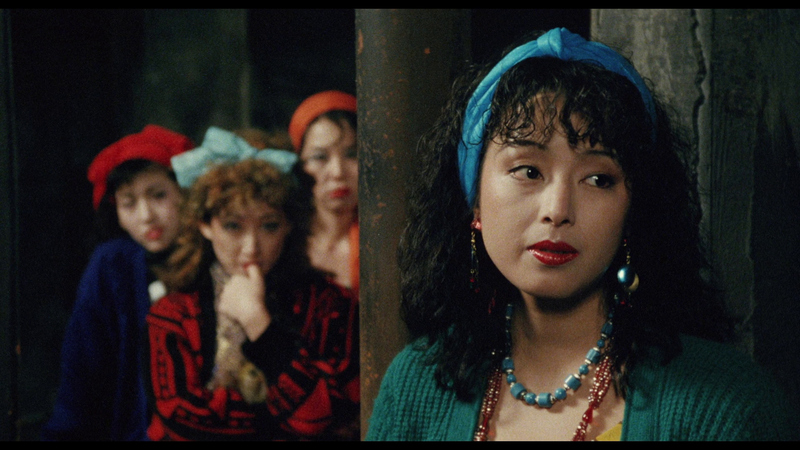
War Left Them Nothing—so They Built Paradise
Gate Of Flesh (Nikutai no mon) (Carmen 1945)
MOVIE REVIEW
Gate Of Flesh (Nikutai no mon) (Carmen 1945)
-
Genre: Action, Crime, Drama
Year Released: 1988, 88 Films Blu-ray 2025
Runtime: 1h 59m
Director(s): Hideo Gosha
Writer(s): Kazuo Kasahara, Taijirô Tamura
Cast: Rino Katase, Yūko Natori, Tsunehiko Watase, Miyuki Kanō, Jinpachi Nezu, Shinsuke Ashida, Tsunehiko Watase
Where to Watch: available now, order your copy here: www.88-films.myshopify.com, www.mvdshop.com, or www.amazon.com
RAVING REVIEW: It doesn’t take long for GATE OF FLESH to make you feel like you’ve wandered into a world already lost to time, not just postwar Tokyo, but a fever dream where survival is dictated by how much you’re willing to give away. Hideo Gosha’s 1988 adaptation of Taijirō Tamura’s novel doesn’t just revisit the source material—it rips it open, covers it with 1980s grit, and dares you to look away. Forget the glamour of period accuracy. This version trades it for something messier, meaner, and emotionally unfiltered.
Set in the aftermath of World War II during the Allied occupation, the film follows a group of women living together in a partially destroyed building, working as prostitutes and enforcing a rigid code of conduct to maintain control over what little they have left. They dream of opening a dancehall called “Paradise,” pooling their earnings toward that fragile goal. But threats close in from all sides: opportunistic gangsters, the emotional weight of trauma, and even a literal unexploded bomb lodged in the building like a curse waiting to go off (maybe a little on the nose, but still.)
There’s no attempt to sanitize these women or their choices. Instead, Gosha frames them as raw embodiments of agency, anger, and adaptation. Society might marginalize them, but they create their world, enforcing strict rules like “no falling in love”. These boundaries become the film’s emotional core, especially after the arrival of a wounded ex-soldier who upends their fragile sense of stability. Love, jealousy, shame, and vengeance bleed across the screen, and none feel performative.
Rino Katase leads a strong ensemble cast, delivering a performance that never asks for sympathy but earns it anyway. Her presence is magnetic—calculating one moment, gutted the next. Yūko Natori and Tsunehiko Watase round out the core cast, each bringing their emotions to a story constantly fraying at the edges. These aren’t stock characters performing trauma; they feel like people fighting to survive a life no one prepared them for.
The cinematography balances shadows with realism. There is no romanticizing the bombed-out ruins or overstylizing them. Instead, every frame feels lived-in, like ash has soaked into the celluloid. The use of cramped interiors and fractured lighting amplifies the sense of entrapment, while the occasional bursts of color—lipstick, clothing, bruises—feel both out of place and perfectly emblematic of lives that no longer follow the rules.
Gosha’s take distinguishes itself through tone and perspective. The pain here is intimate, the betrayals personal, and the consequences final. The film moves with a slow, simmering intensity that favors emotional blowouts over plot twists. When violence erupts—and it does—it hits with impact, but never with exploitation.
88 Films’ Blu-ray release gives this overlooked adaptation the attention it deserves. The restoration is sharp, and the special features—including commentary, interviews, and a filmed introduction—provide meaningful context. This package elevates the film beyond obscurity and reintroduces it as an important entry in Gosha’s career.
This version struggles with its occasional unevenness. Some performances edge toward melodrama, and the stylistic choices won’t work for everyone. The clash between 1980s aesthetics and 1940s setting might break the immersion for viewers expecting historical accuracy. But dismissing these choices as flaws might be missing the point—GATE OF FLESH isn’t interested in accuracy. It’s interesting in urgency. And on that front, it delivers.
When the film's final moments arrive, “Paradise” feels like a bitter punchline. The dream that sustained these women never had a chance—not because they didn’t try, but because their world was rigged against them in nearly every way. What’s left is a broken space and a memory of what could’ve been, preserved in ash and lipstick. GATE OF FLESH isn’t a story of redemption. It’s a slow, painful recognition that survival doesn’t come with closure. And that’s exactly what makes it worth watching.
SPECIAL FEATURES:
High-Definition Blu-Ray Presentation In 1.85:1 Aspect Ratio
Original Mono Audio With New English Subtitles
Audio Commentary By Amber T. And Jasper Sharp
Brand New Filmed Introduction By Earl Jackson
Exclusive Interview With Toei Tattoo Artist Seiji Mouri
Stills Gallery
Trailer
Teaser
Booklet Essays By Robin Gatto And Irene González-López
Please visit https://linktr.ee/overlyhonestr for more reviews.
You can follow me on Letterboxd, Instagram, Twitter, and YouTube. My social media accounts can also be found on most platforms by searching for 'Overly Honest Reviews'.
I’m always happy to hear from my readers; please don't hesitate to say hello or send me any questions about movies.
[photo courtesy of 88 FILMS, MVD ENTERTAINMENT]
DISCLAIMER:
At Overly Honest Movie Reviews, we value honesty and transparency. Occasionally, we receive complimentary items for review, including DVDs, Blu-rays, CDs, Vinyl Records, Books, and more. We assure you that these arrangements do not influence our reviews, as we are committed to providing unbiased and sincere evaluations. We aim to help you make informed entertainment choices regardless of our relationship with distributors or producers.
Amazon Affiliate Links:
Additionally, this site contains Amazon affiliate links. If you purchase through these links, we may receive a commission. This affiliate arrangement does not affect our commitment to honest reviews and helps support our site. We appreciate your trust and support in navigating these links.